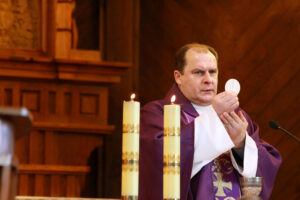
Most people, even regular church-goers, don’t think a lot about what it takes to become a pastor. Being called to the ministry is an intense process, but it’s one that is also intensely personal. No two paths are exactly the same.
It might surprise people to learn how much formal education is required to enter the ministry today.
At a bare minimum, pastors will have to earn a bachelor’s degree in Biblical or pastoral studies or a related area. In most cases, they’ll earn that four-year degree as a stepping-stone on their path to a master’s degree, which is one of the most common requirements for ordination in many Christian denominations.
Explore a Christian Ministry Degree – Request More Info Today!
So pursuing a college degree in order to enter the ministry is in the normal course of things. But understanding what earning a bachelor’s degree in pastoral ministry entails, what it will cost, and how to get accepted to those programs may require a little explanation.
Christian Bachelor’s Degrees Go By Many Names and Offer a Wealth of Options for Your Path into Ministry
Bachelor’s programs designed to prepare you for a career in the ministry aren’t just called pastoral studies. Instead, there are a wide range of degree titles and specializations available, all of which offer you a unique kind of preparation for working in ministry.
- Pastoral Studies
- Christian Ministry/Studies
- Worship Studies
- Children's Ministry
- Theology
- Divinity
- Religious Studies
- Bible Studies
…and many more. Sometimes it seems like every university that offers a four-year program in ministerial studies has their own take on it, and a different name for that degree.
But that is one of the excellent things about ministry degrees! The sheer range of different perspectives, curriculums, and experiences that are offered in this field give you a lot of options for your education. Far more than with most secular fields of study, Christian schools present an enormously diverse array of choices for approaching pastoral studies.
Why You’ll Find So Many Different Degree Titles in Christian Studies Bachelor’s Degrees
 One thing you will commonly find in bachelor’s degrees in Christian studies is that some schools offer a full degree in a particular specialization, while others offer a more general degree with an optional concentration in that specialization. For example, you’ll find a number of schools that offer a Bachelor’s in Pastoral Ministries, while others offer a Bachelor of Arts in Ministry with a concentration in pastoral ministries. Some schools even offer both!
One thing you will commonly find in bachelor’s degrees in Christian studies is that some schools offer a full degree in a particular specialization, while others offer a more general degree with an optional concentration in that specialization. For example, you’ll find a number of schools that offer a Bachelor’s in Pastoral Ministries, while others offer a Bachelor of Arts in Ministry with a concentration in pastoral ministries. Some schools even offer both!
Does the full degree offer you more intensive preparation in the subject? Does taking the concentration in a more general degree give you better breadth and context?
When you get right down into the gritty details, you'll find there is no hard rule as to which option covers a specialty in greater depth. The differences come down to how individual colleges design their curriculum. In some cases, you may well find a concentration option that is more intensive than a degree with that title.
This is a boon for prospective students, who have a much better opportunity for finding a program that aligns with their own calling and curriculum preferences.
Bachelor's Degrees in Pastoral Ministry Are Largely the Province of Private Christian Colleges
One thing you'll notice pretty quickly is that most colleges that offer degrees in ministry are private schools. Public schools are nonreligious institutions, catering to believers and nonbelievers alike. They may offer degrees in theology or comparative religious studies, but those are often conducted from a secular, analytical perspective, not necessarily one informed by faith.
To get the kind of spiritual education you will want and need for a life in the ministry, private Christian schools will be your best bet.
That doesn’t completely rule out earning a religious studies degree at a public university, however. Since most denominations prefer or require candidates for the ministry who have a master's degree or higher, it's still possible to get a degree from a public school and go on to a private Christian university for your graduate studies.
You'll want to check with the schools you plan to attend to make sure this lines up with their admissions policies and preferences. Much may depend on the specific major you choose—a theology or comparative religions bachelor's program may not vary much between secular and religious schools. Pastoral studies or degrees in Christian ministry, on the other hand, simply won't be found other than at private Christian schools.
Getting Accepted Into a Competitive Bachelor's Program Is Your First Test for the Ministry
According to the Census Bureau, more than a third of Americans over the age of 25 hold bachelor's degrees or higher college qualifications as of 2019. College attendance has exploded over the past twenty or thirty years.
What that means is that there is a lot of competition to get into bachelor's programs. That's particularly true at the kind of private Christian schools that are most likely to offer the kind of degrees in pastoral studies that you will need to pursue a career in the ministry.
So getting into these programs is far from a sure thing. Every school is free to set their own requirements for applicants, but some of the most common qualifications include:
- Have a high school diploma or GED with a certain minimum grade point average
- Take a standardized test such as the SAT or ACT and pass with a certain minimum verbal and math score
- Submitting a short essay discussing your background and aspirations
Because most universities that offer bachelor’s in pastoral studies degrees are Christian schools, you may also need to offer some bona fides about your own beliefs. That could mean:
- Getting a letter of reference from your pastor or spiritual leader
- Writing an essay about your personal testimony and faith
- Being interviewed about your beliefs
A Christian Bachelor’s Degree Teaches Far More Than Just Religion
 Despite all the different names and specializations, you will find a lot in common between all kinds of bachelor’s degrees in pastoral ministry. One of the key things that makes these degrees so valuable is that they go way beyond a religious education in their curriculum.
Despite all the different names and specializations, you will find a lot in common between all kinds of bachelor’s degrees in pastoral ministry. One of the key things that makes these degrees so valuable is that they go way beyond a religious education in their curriculum.
Meeting the core requirements of a four-year bachelor’s degree from an accredited school means spending as much as half your class time in a variety of general studies courses. These are exactly the same classes that thousands of other college students go through on the way to their own types of degrees. They cover subjects such as:
Writing and Literature - The core for liberal arts degrees for hundreds of years has been the study of the written word and the art of writing. Learning in any field comes through reading and comprehension, so your success in any degree program will rest on these skills. The history of literature is the history of history itself, giving you perspectives on society and culture through the ages, and frequently reflecting on Christianity and religion. The more you read classic and modern works, the more your own communication skills will improve, which is important to your success in the ministry as well as graduate studies that many ministerial positions require.
History and Social Studies - Speaking of history and social studies, you’ll also investigate those subjects directly. You might explore European, American, or World History—in all of them, you’ll find plenty of evidence of the role of Christianity woven through the events that have shaped the world. Any minister has to embrace the culture in which they serve, and this kind of coursework will help better inform you how society has evolved and what trends and strains it feels today.
Math and Science - While it’s true that the average pastor doesn’t have a whole lot of arithmetic-driven tasks in their average day, the standards governing a well-educated college graduate means you will have to meet some minimum standards in math and science coursework. Most schools have a range of different options for fulfilling those requirements, so you may choose from classes as diverse as physics, biology, geometry, or economics. Basic bookkeeping skills are always welcome among church managers, and pastors can find a command of economic principles to be valuable in understanding challenges and social justice issues in their community, so you can build valuable and applicable knowledge in this area.
Philosophy and Logic - Critical thinking skills are a big part of the reason that many employers, including churches, prefer to hire college graduates. They can be even more important in the ministry, which involves both practical problem-solving challenges and regularly confronting thorny moral and ethical issues. Coursework in philosophy and ethics help give you the framework handed down from generations of Christian philosophers and thinkers to solve these problems in your own ministry.
All of these general knowledge and liberal arts skills add up to what the community and employers consider to be a college education. Meeting those expectations means achieving standards of literacy, knowledge, and critical-thinking skills that allow you to adapt to all kinds of work and life situations in the modern world.
 Going beyond those valuable qualities, though, you’ll find that many of these courses also give you real skills that can apply in your pastoral studies or work in the ministry itself. What pastor is successful without the skills in composition and rhetoric required to write and give a sermon? How can you successfully counsel and minister without an understanding of human psychology and culture? Understanding history is often key to understanding the society in which you will serve.
Going beyond those valuable qualities, though, you’ll find that many of these courses also give you real skills that can apply in your pastoral studies or work in the ministry itself. What pastor is successful without the skills in composition and rhetoric required to write and give a sermon? How can you successfully counsel and minister without an understanding of human psychology and culture? Understanding history is often key to understanding the society in which you will serve.
Successful pastoral studies graduates know that they need to pursue these traditional liberal studies courses with as much intensity as their religious studies to prepare for a life in the ministry.
Explore a Christian Ministry Degree – Request More Info Today!
Christian Coursework is the Heart and Soul of a Bachelor’s Degree in Pastoral Ministry
What you are really interested in is probably going to be the scriptural and theological subjects you get to dive into, however. People have been studying the Word of God and the philosophy of Christianity for thousands of years now, so there is plenty of material to study. You’ll find a breathtaking array of classes to take in bachelor’s programs in Christian ministry.
The core, required coursework will usually involve classes in topics like:
Biblical Hermeneutics - No bachelor’s degree in religion or ministry is offered without a heavy course load in reading and understanding the Bible. This is known as hermeneutics, and it’s usually split at the very least into separate courses of study for the Old and New Testaments. In some cases, you’ll go into even more detail, with classes specific to the Gospels, the Pentateuch, or even individual authors like Paul, John, or Isaiah.
Foundations of Christianity - The history of the world is deeply intertwined with the formation and growth of Christianity. The church itself has an intricate and detailed history as well, one that has been influenced by culture just as it has shaped secular culture. Understanding how the modern roots of faith have been shaped in the centuries since Christ walked the Earth is key to developing your knowledge of religion and the forms and expressions of faith that it involves in today’s world.
Pastoral Leadership and Communication - Ministers are expected to be leaders. Bachelor’s degrees in pastoral ministry start you off in developing the moral and ecumenical qualities that all pastors are expected to exemplify. This coursework will also serve to build on your studies in writing, psychology, and communication skills to hone your expertise in counseling and evangelizing. You might have specific courses in counseling, different types of ministry such as family or youth, or in some of the general challenges in building and growing a church. Practical instruction in the nuts and bolts of administering a church are also typically covered.
Christian Theology and Comparative Religions - Most Christian studies programs don’t restrict themselves to Christianity alone. You’ll have courses that teach you about the differences and similarities between Christianity and other faiths such as Islam and Buddhism. By exploring how the spiritual impulse has been filled in different cultures and by different religions through history, you’ll learn how to explore some of the philosophical and spiritual mysteries of Christianity in better detail and become a more effective evangelist for your faith.
Spiritual Formation - A bachelor’s degree in pastoral studies is just as much a journey of personal development as it is of knowledge and skill. Colleges help you along this path with required coursework in spiritual development. These classes cover Christian ethics, moral duty, and the process of transformation in believers that encourages you to grow in your relationship with God through your entire life. Expanding the calling that led you into this degree program also helps you to understand and explore that process in others, which is a critical part of working as a pastor.
Because the ministry is an office of devotion, the objectives for Christian ministry degrees will require you to demonstrate character and growth over the course of your studies.
Of course, any specific concentration or major will have its own area of focus. Bachelor’s degrees in religious studies will probably have a broad survey of world religions and general theological thinking; bachelor’s degrees in pastoral studies will focus more on church development, pastoral care, and preaching.
There are also wide varieties of electives to choose from to fill out your experience. If you can imagine a specific aspect of the ministry or Bible studies to investigate, you can probably find a class for it!
Should You Choose a Christian Bachelor’s Degree with Courses in Biblical Languages?
 A surprising number of four-year degrees in ministry include the option of studying Hebrew, Greek, or Latin as part of the curriculum. Some even require it.
A surprising number of four-year degrees in ministry include the option of studying Hebrew, Greek, or Latin as part of the curriculum. Some even require it.
Studying Scripture in the languages it was originally written in offers an undiluted understanding of the meaning and implications of the text, as well as the opportunity to explore subsequent translations and interpretations with better knowledge. It’s somewhat more common to find these language requirements in degrees or concentrations in Bible studies, which focus more on the Word of God in their coursework.
Some denominations require some knowledge of Latin in order for you to become ordained. It’s much easier to pick this up during your undergraduate studies than it would be to learn it after graduation, so it’s worth checking out whether or not you’ll need to fulfill this requirement before making your choice.
Most bachelor’s programs have some foreign language course requirements anyway, which can be satisfied through courses in Biblical languages. On the other hand, you might find it more useful to your own mission to pick up something like Chinese or Spanish, instead.
Although knowledge of the languages the Bible was written in might help you gain some insights, it’s unlikely that an undergraduate with a couple years of Greek under their belt will develop some major new interpretive theory that has escaped thousands of advanced scholars over the years.
Picking the Right School To Pursue Your Bachelor’s Degree in Pastoral Studies
 Colleges have certain standards that you will have to meet in order to earn admissions, but you can also have your own high standards for them. There are many options available and that means you have a great opportunity to find a degree program that checks all of your boxes.
Colleges have certain standards that you will have to meet in order to earn admissions, but you can also have your own high standards for them. There are many options available and that means you have a great opportunity to find a degree program that checks all of your boxes.
On the other hand, all those choices can also make it very difficult to narrow down your top picks. We have more than a few ideas about what qualifies a Christian bachelor's program to be counted among the best. But you still have to consider what's best for your particular calling. There are a few things you should immediately consider when looking at any Christian bachelor’s programs to make sure you get the right match for your calling:
Service opportunities - Earning a bachelor’s degree for most people just involves showing up to class and passing the right exams. For bachelor’s programs in pastoral studies, though, you will have to go further. To accomplish that and to become a better Christian overall, you should look for schools that have active and interesting service opportunities.
Reputation - Reputations are earned, not bought, so finding a school that has an excellent standing in the ecclesiastical community is always a good idea. When you earn a bachelor’s in pastoral ministry, you’ll be carrying that name around with you for the rest of your career. You want it to be a great one.
Instructors - A good teacher can take a dull subject and make it soar; a poor one can dampen the interests of the most fervent pastoral student. Look for schools where your instructors are as devoted to education as they are to Christ, and who have the expertise and experience to pass along.
Doctrine - Not all Christian schools follow the same branches of faith. Your denomination will be an important determining factor in schools to consider—make sure the Statement of Belief the school subscribes to is acceptable to your own church.
Graduation and post-graduation employment rates are often published by schools, so you can do some head-to-head comparisons to get some idea of how your options stack up.
Accreditation Helps Sort the Wheat From the Chaff in Picking Christian Colleges
His winnowing fork is in his hand, and he will clear his threshing floor, gathering his wheat into the barn and burning up the chaff with unquenchable fire.
~ Matthew 3:12
You can help satisfy a lot of your questions about the quality of a university by making sure you are only picking from schools that have been accredited by an accreditor that has been recognized by the Council for Higher Education Accreditation (CHEA), or the U.S. Department of Education.
Those accreditors handle a lot of the basic checking on quality and standards of education to make sure a school is really delivering what the community considers to be a bachelor’s-level education.
That means digging into the gritty details of how the school is run and staffed. Accreditation is an exhaustive process that can take years and involves extensive documentation review and even on-site visits. Periodic check-ups make sure a school is keeping up their standards over time.
Everything From Bachelor’s Degrees in Children’s Ministry to Bible Studies Are Available Online
The church might have a reputation for being old-fashioned and traditional, but the reality is that Christian schools are just as cutting-edge in pedagogy and educational technologies as any other university. That means you can find all kinds of bachelor’s programs in the ministry available online today.
The reasons you might choose these schools is the same reason anyone considers online degrees today:
- Extend your education without relocating - You can keep your costs down and disruption low by studying from home without having to move halfway across the country to get the kind of training you need.
- Open up your options for a perfect program - With every online college in the country on the menu, you have a much better chance of finding the perfect fit for your needs compared to only looking at regional colleges.
- Fit school around your busy schedule - Most online programs offer very flexible attendance options, letting you time-shift your study time to whenever is most convenient. Whether it’s after tucking the kids in or during a spare moment on lunch break, you can learn on your own time instead of a rigid schedule.
Online schools can take away a lot of the tradeoffs that many people face in picking a bachelor’s program in pastoral studies. That opens up opportunities for people who might have thought they’d never have a chance at entering the ministry.
Explore a Christian Ministry Degree – Request More Info Today!
Covering the Costs of a Christian Studies Bachelor's Degree
 It’s been hard to avoid reading headlines over the past few years about how expensive getting a college education can be. It’s particularly become an issue as college degrees have become a requirement for professions that are not known for high salaries… such as the ministry.
It’s been hard to avoid reading headlines over the past few years about how expensive getting a college education can be. It’s particularly become an issue as college degrees have become a requirement for professions that are not known for high salaries… such as the ministry.
You will need to carefully consider the costs of a bachelor’s degree in pastoral ministry to make sure you can afford the education you need to become a minister.
The National Center for Education Statistics (NCES) is the go-to resource for establishing average costs of tuition in American colleges. Their most recent data, from the 2019-2020 school year, puts the average annual cost of tuition and fees at four-year schools at $16,647.
That puts the total cost of a bachelor’s degree in pastoral studies, excluding room and board, at $66,588 for all four years.
But averages can also be deceptive. Including all four-year schools in that data, for example, may not really represent most divinity or Christian ministry degree programs for the simple fact that they are more likely to be offered by private Christian schools.
Private schools are almost always more expensive than state universities, which are underwritten, in part, by tax dollars. Private universities have to make up the financial gap through fundraising and increased tuition rates.
When you look at the NCES data for private institutions, you’ll find that the annual cost is nearly twice as much as the overall average. You can expect to pay $32,769 per year at the typical private school, for a total cost of $131,076 for your bachelor’s degree in pastoral studies.
Exploring Options to Help Pay for Your Christian Bachelor’s Degree
Very few people can afford to just write out a check for that kind of investment. And even those who can still take the time to find the most affordable Christian bachelor's degrees available. According to NCES, in 2018-19, about 43 percent of first-time, full-time undergraduate students received some sort of school loans to help pay for their degree. As you might expect, that number is slightly higher for students at costlier private schools.
Student loans are probably the primary way that you’ll make up the gap between what you can afford to pay out of pocket and what the bills will be for your studies. Although student loan expense in America is significant, the terms of federal government student loans are usually quite generous—low interest rates, no interest accrual while you remain in school, and a grace period after graduation before you have to begin payments. There are no credit checks and broad eligibility standards mean almost anyone can get them, although there are borrowing limits.
And my God will meet all your needs according to the riches of his glory in Christ Jesus.
~ Philippians 4:19
One thing about following your true calling, however, is that there is always going to be a way to make it work. And for many Christian studies students, that comes in the forms of grant and scholarship opportunities.
Many Christian universities offer general financial aid grants themselves, usually based on need. These do not need to be paid back but do often come with attendance and grade point average maintenance requirements, so you have to be diligent in your studies.
Some of these scholarships are available to any student, while others may be aimed specifically at those pursuing pastoral studies. Often, they will cover only a portion of your expenses or tuition, so you will likely have to look for multiple grants or a combination of grants and loans to get it done.
Other Christian organizations also offer scholarships to encourage those studying to enter the ministry. Even your own church might have options. It’s worth discussing the available opportunities with your own church elders as well as the college financial aid office where you plan to attend.
What Can You Do With a Bachelor’s Degree in Pastoral Ministry?
 A bachelor’s degree in the ministry is the level of education where real, full-time positions in pastoral work start to open up. While almost all churches and religious organizations will prefer a master’s degree for ordained ministry jobs, it’s possible to get your foot in the door with a bachelor’s degree.
A bachelor’s degree in the ministry is the level of education where real, full-time positions in pastoral work start to open up. While almost all churches and religious organizations will prefer a master’s degree for ordained ministry jobs, it’s possible to get your foot in the door with a bachelor’s degree.
You will also find non-ordained positions in the ministry or religious organizations that are available with only a bachelor’s degree.
Your calling may lead you not into a pastoral position, but to some other role of service and responsibility in a religious organization. Everything from overseas missions to regional hospital systems to local food banks are run by faith-based organizations.
Like any kind of human endeavor, these programs need people with leadership, problem-solving skills, and general knowledge of culture and society. Those are all things that you’ll have after graduating with a bachelor’s degree in ministry, so you’ll find many opportunities to serve your calling and express your faith.
A bachelor’s degree is also the basic level of qualification that you need to become a teacher. With Christian schools employing more than 20,000 educators as of 2020 according to the Bureau of Labor Statistics, that opens up another popular and in-demand option for employment.
 A calling to the ministry will almost certainly see you going on to graduate studies in divinity. But a bachelor’s degree in pastoral studies or related fields is probably the best basis you can have for succeeding at the master’s degree level. With a solid foundation of essential Scriptural knowledge and reasoning skills, you have better chances of getting accepted and mastering advanced pastoral studies.
A calling to the ministry will almost certainly see you going on to graduate studies in divinity. But a bachelor’s degree in pastoral studies or related fields is probably the best basis you can have for succeeding at the master’s degree level. With a solid foundation of essential Scriptural knowledge and reasoning skills, you have better chances of getting accepted and mastering advanced pastoral studies.
Your diploma offers the promise of future training leading to ordination, or a satisfying career on another path of service.
Explore a Christian Ministry Degree – Request More Info Today!
Nevertheless, God’s solid foundation stands firm, sealed with this inscription: “The Lord knows those who are his,” and, “Everyone who confesses the name of the Lord must turn away from wickedness.”
~ 2 Timothy 2:19








